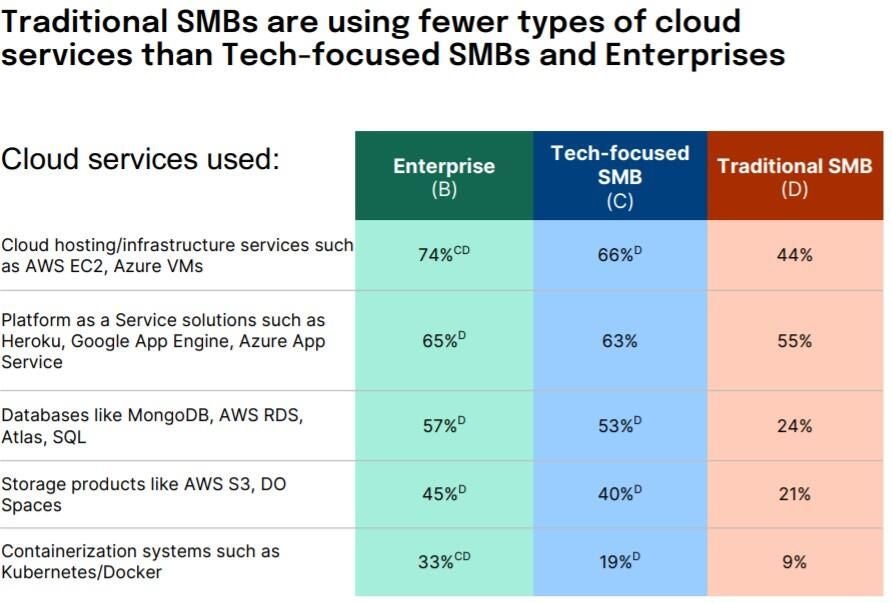
Image: DigitalOcean
SMBs are using cloud services even more than last year but progress is slowed due to a lack of expertise. A survey of 2,400 companies found that 65% of companies increased the use of cloud infrastructure solutions in 2020 but 86% said their usage went up in 2021.
Cloud services provider DigitalOcean published its latest Currents report this week, which is based on 2,400 interviews in 48 countries conducted by Aspen Finn from September through October 2021. Respondents were split into three segments:
- Enterprise companies with 500 or more employees
- Tech-focused SMBs with under 500 employees
- Traditional SMBs with under 500 employees
Both traditional SMBs and tech-focused SMBs have specific pain points and unique considerations when choosing a cloud provider. For traditional SMBs, the biggest business pain points are recovering from the pandemic and keeping up with the technology curve. For tech focused companies, the biggest challenges are ensuring technology meets the needs of customers and the needs of the business, in addition to recovering from the impact of COVID-19.
SEE: 85% of organizations will be cloud-first by 2025, according to Gartner
When it comes to technology challenges, traditional SMBs are most worried about the cost of services, even more so than cybersecurity threats, which is the top worry for the other two groups. According to the report, once a business believes that the cloud infrastructure is secure, they then assess the functionality and reliability of the solution. Traditional SMBs must deal with cost concerns before assessing the functionality and reliability of a cloud solution.
Yancey Spruill, CEO at DigitalOcean, said in a press release that SMBs need a particular type of cloud solution.
“The big public clouds are designed specifically to suit the needs of large enterprises, but traditional SMBs require a different approach — one that’s centered around simplicity, support, and cost-effectiveness,” he said.
Enterprise companies have an edge in cloud computing because those organizations have dedicated IT specialists to manage infrastructure. With smaller companies, the CEO and presidents are more often the ones in charge of those deployments.
Traditional SMB IT decision makers are also the most likely to struggle with managing IT infrastructure, with only 46% feeling that it is easy to maintain and modify, and they are the most likely to say that finding the time to maintain and manage their infrastructure is their top tech challenge (12%). Forty-three percent of traditional SMBs have no full-time technical staff.
This lack of technical expertise is reflected in the type of cloud deployments used by each type of company. Enterprises and tech-focused SMBs are equally likely to use multi-cloud and hybrid cloud infrastructure, while traditional companies are much more likely to use single cloud deployments. A majority of tech-focused companies (59%) said they made a conscious decision to deploy a multi-cloud infrastructure compared to 45% of enterprise companies and 43% of traditional SMBs.
Also, traditional SMBs are less likely to use fewer types of cloud services, such as hosting, platform-as-a-service solutions and databases, than the other two groups. Traditional SMBs are most likely to use PaaS solutions such as Heroku, Google App Engine and Azure App services at 55% of those survey respondents. Only 44% of traditional SMBs use hosting and infrastructure services, compared to 74% of enterprises and 66% of tech-focused small companies.